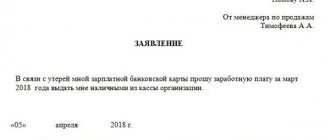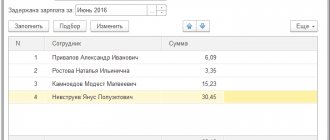When hiring a new employee, the parties must sign an employment contract between themselves. This is the main document that regulates the relationship between employee and employer.
The same validity conditions apply to an employment contract as to other civil contracts. That is, it must contain essential and additional conditions.
Essential conditions include those conditions without which the contract loses its validity. This includes wages. Remuneration for the work performed must be specified in the employment contract. Labor remuneration is the salary of a specific employee. It depends on several factors:
- qualifications;
- level of education;
- experience in this position.
That is, two employees occupying the same position may receive different wages. But the salary received cannot be lower than the level established at the federal level - the minimum wage. From May 1, 2018, the minimum wage is equal to the subsistence level.
Salary amount in the employment contract
Salary is a prerequisite for the validity of an employment contract. Many employers make the following mistakes when drawing up a standard contract with an employee:
- do not indicate the specific salary amount in the “body” of the contract. For example, they write it like this: “salary according to the staffing table.” This is not true! An agreement containing such conditions can be declared invalid in court. You need to indicate a specific numerical value - 25,000 rubles (twenty-five thousand rubles). Be sure to use numbers first and then words;
- incorrect indication of the payment of bonuses, bonuses, allowances, etc.;
- omission of the fact of payment of the advance. According to the Labor Code of the Russian Federation, wages must be paid twice a month, every half month. Specific dates for payment of advance payments and salaries can be specified either in the employment contract or in local regulations. Payments cannot be made once a month, even if the employee himself requests this in writing;
- Incorrect wage designation. It also happens that the employer pays part of the salary in some kind of product, but “forgets” to mention this in the contract. This is a big mistake! The Labor Code of the Russian Federation states that payments in food products cannot exceed 20% of the employee’s monthly salary. Payments in kind can only be made with the written consent of the worker. Also, you cannot indicate your salary in foreign currency. Regardless of the currency of which country the employer makes payments to its counterparties, it must pay wages exclusively in rubles;
- Many employers, wanting to save on their employees and their salaries, introduce penalties for any, even the smallest violations and stipulate them in the employment contract. If the management decided to include sanctions for violations in the contract, then their list must comply with Art. 137 Labor Code of the Russian Federation. Other types of wage deductions are considered illegal. In addition, if the employer has not violated the list from Art. 137 of the Labor Code of the Russian Federation, he must remember that the amount of all write-offs cannot exceed 20% of the salary of a particular employee. In some cases, this percentage can rise to 50%, and in exceptional cases – up to 70%.
How to properly draw up an employment contract with piecework wages
Each employment contract (piece-rate wages) requires the employer to draw up certain nuances when drawing up. In particular, it must provide for how non-working holidays will be paid for, as well as set prices. Since the norms of Article 57 of the Labor Code of the Russian Federation directly provide for the employer’s obligation to indicate in the contract with employees all conditions of remuneration, namely:
- the size of the employee's tariff rate (official salary),
- surcharges,
- allowances and incentive payments,
- prices per unit of products produced or work (services) performed.
However, it is allowed for the document to contain references to internal local acts that set prices at the enterprise for a manufactured unit of product (another operation or work, service) and production standards. In this case, in the text of the TD you can write the following phrase:
A piecework wage system is established for the employee. Wages are calculated based on piece rates established in the wage regulations and the amount of work performed by the employee.
In this case, the employee with whom the TD is concluded must be familiarized with the order or other local act against signature at the time of employment. At the same time, it is important to remember that in accordance with the requirements of Article 136 of the Labor Code of the Russian Federation, wages to workers with piecework wages must be paid in the general manner, namely at least twice a month, with an interval of no more than 15 days between payments.
Description of payment of bonuses and premiums
If an employer pays its employees additional bonuses and premiums, then it can stipulate their availability in the employment contract. But you need to be very careful. It is not enough to indicate the presence of additional payments and indicate their size; you also need to specify the conditions for receiving them.
If you do not reflect the conditions for receiving additional bonuses and allowances, and also do not provide references to local regulations, it will turn out that the employer will have to pay them all. That is, he will have to pay all those bonuses, bonuses, allowances and other incentive payments regularly along with wages.
If the employer decides to make a reference to a normative act, then he must accurately reflect all the details of this document. Without these details, this link will also not be valid. Any audit from the tax office or labor inspectorate will identify this deficiency, and then penalties will be applied to the employer.
Regulatory framework for entering working conditions into TD
According to the provisions of Art. 57 of the Labor Code of the Russian Federation, the conditions are extremely mandatory for drawing up an employment agreement. They include the following criteria and elements:
- basic rate or salary (taking into account tariff features);
- allowances;
- bonus payments;
- incentive amounts.
It is also the responsibility of the payroll manager to determine the basic form in which the employee will be compensated for hard work.
In Part 1 of Art. 135 of the Labor Code of the Russian Federation states that the salary paid to a specific employee is subject to establishment within the framework of an employment agreement, in accordance with the working conditions existing within the walls of the enterprise. They are included in a section specially created by the employer dedicated to this issue.
Moreover, the list includes not only the main part of the salary, but also auxiliary payments of any shape, type and size.
In Art. 57 (h.
2 paragraph 5) states that it is permissible in the agreement not to indicate specific size parameters for bonuses, allowances and surcharges. If these values are established by the employer, he has the right to indicate their sizes and varieties in the contract, as a reference to the LNA (this right is confirmed within the framework of the explanations provided by the Rostrud organization).
What does the salary depend on?
An official salary is a fixed amount of money that an employee receives for performing his immediate job responsibilities. It does not include any type of payment - neither incentive, nor social, nor compensation.
The salary of any employee depends on many factors, including:
- workload;
- education according to the profile of the work performed;
- qualifications;
- experience in this position.
The amount of remuneration for working personnel is established based on the salary scheme that is used in a single enterprise or in an entire industry.
If an enterprise is financed from the budget of one of the levels, then it must adhere to the industry salary scheme. If the enterprise operates exclusively at its own expense, then it is obliged to approve the staffing table, in which the nomenclature of official salaries must be specified.
Additional agreement upon salary changes
Salary is one of the essential terms of an employment contract. If there is a change in salary, this must be reflected in the documents.
This does not mean that you need to immediately rewrite the new employment contract. The Labor Code of the Russian Federation has provided for the possibility of changing the terms of an employment contract by drawing up and signing an additional agreement. This rule also applies to changes in the salary of a specific employee.
If an employee’s salary or other terms of the employment contract change, the employer must take the following steps:
- prepare a model of an additional agreement;
- discuss its provisions with the employee;
- after reaching an agreement, the parties sign this agreement;
- it comes into force from the moment of its signing.
The employer does not have the right to independently change the terms of the employment contract. In addition, he must notify his employee in writing that there is a change in salary. This must be done at least 2 months in advance. The written notice must be given directly to the employee. The employee must be familiar with it by signature. If the employee does not agree to the new terms of the contract, including a change in his salary, then the employment contract terminates. And the employee is subject to dismissal.
If the parties reach an agreement, then they sign an additional agreement in 2 copies - one for each party to the labor relationship. When drawing up an agreement, it is necessary to indicate the details of the employment contract to which this agreement relates.
Specifying the terms of salary payment in the contract
The salary is paid to the employee for the performance of his direct labor duties. The salary amount must be specified in the employment contract. It must be written first in numbers, and then in words, indicating kopecks. It cannot be stated that payment occurs “according to the staffing schedule.”
If the employer has a system of additional payments to the basic salary, then this also needs to be prescribed. In this case, you need to provide a link to a specific local act related to the wage system. If the enterprise does not have such an act, then it is necessary to specify in the contract all additional, compensation, incentive and other payments, as well as indicate the conditions under which these payments are made.
If the company is located and operates in the Far North or in areas that have a similar status, then do not forget about northern allowances and regional coefficients. An employee must be very careful when signing an employment contract.
There are unscrupulous employers who “lower” the regional coefficient. For example, during an interview with applicant P., the employer announced his salary of 25,000 rubles, and P. agreed. In fact, in the “body” of the employment contract, the employer indicated a salary of 22,000 rubles and 3,000 rubles - this is the regional coefficient. It turns out that the employee will receive only 22,000 rubles, since personal income tax will be calculated in the amount of 13%.
In fact, it should be written like this:
- salary of 25,000 rubles;
- regional coefficient, according to the one established for a given region by the Government of the Russian Federation.
Calculation of personal income tax occurs only after all allowances and coefficients.
What terms of remuneration must be specified?
The following terms and conditions of remuneration must be specified in the employment contract:
- Salary and additional benefits. The salary amount is mandatory. If the enterprise has a system of bonuses to the basic rate, additional payments as compensation or incentives for workers, bonuses, etc., established with the necessary agreements on remuneration, then in the employment contract you need to make a reference to these local regulations. If the LNA is not in effect in an organization, the contract specifies all additional payments and the reasons why they are given to the employee.
- Taxes. The salary in the employment contract is stated without taking into account the 13% deduction of personal income tax. That is, the payment (excluding all kinds of bonuses and allowances) is somewhat less than stated in the clause of the document. The employer does not have the right to deduct other taxes from the salary: contributions to the Pension Fund, the compulsory health insurance fund, etc. are paid by him from his own funds.
- Social insurance. Part 2 art. 57 of the Labor Code of the Russian Federation states that the employment contract must include a provision on compulsory social insurance. All types of social payments should not be listed. The phrase will be enough: “The enterprise guarantees to provide insurance for the employee in the compulsory social insurance system in accordance with the norms of the Labor Code of the Russian Federation and other Federal Laws.” You can refer to the specified documents. If additional insurance is in effect in the organization, then it is permissible to refer to the corresponding LNA (if available) or write down more details about it.
- Regional coefficient. Here, for example, an employer can easily deceive an employee. Let’s say that at an interview with I.I. Ivanov, the employer agreed on a salary of 20,000 rubles. And when drawing up the employment contract, the salary was set at 17,400 rubles. plus the Republic of Kazakhstan in the amount of 2,600 rubles, in the amount allegedly 20,000. When receiving a salary, it turned out that only 17,400 rubles were given in hand, since 13% of personal income tax was deducted. From a legal point of view, everything is correct here.
An example of the design of provisions on salary and allowances:
Example of salary indication in an employment contract
Frequency of payments
According to the Labor Code of the Russian Federation, wages must be paid 2 times a month - every half month. Specific payment dates must be indicated in one of these documents:
- employment contract;
- collective agreement;
- labor regulations.
It is imperative to record specific payment days. This could be 2 days a month or several. For example, the advance payment is on the 25th, and the salary is on the 5th. Or you can write it as follows - the advance is paid from the 23rd to the 25th of each month, and the salary is paid from the 5th to the 7th of each month. This is convenient for large enterprises with several thousand employees.
The employer may establish another frequency of payments, but not less than twice a month. The law does not prohibit paying employees the money they earn, for example, 4 times a month. But it is imperative to indicate this in the employment contract or in another local regulatory act, to which a link will be given in the employment contract, the details of this LNA.
Sample order on the timing of payment of wages
The form of this order is developed by the employer independently. It is recommended to include the following details and information:
- publication date;
- registration number under which the order is recorded in the journal of local administrative documents;
- place of compilation;
- employer's name;
- title of the document (order on the timing of payment of wages);
- The text part of the order itself, which indicates specific dates for payment of wages (for the first and second half of the month), provides a link to the legislation - Art. 136 of the Labor Code of the Russian Federation, and a responsible employee is appointed who will familiarize employees with the approved deadlines;
- manager's signature;
- signature of the designated responsible employee.
You can find a sample salary order here.
For information on how to register an order, read the article “ Journal of registration of orders for personnel - sample” .
Hourly wage
An employee’s work can also be paid by the hour, that is, for actual stay at the workplace. But such working conditions must be specified in the employment contract.
Each hour of work must “cost” a certain amount of money. To calculate it, you need to divide the minimum wage for a given position by the number of hours that the employee will have to stay at the workplace. You will get a certain tariff rate.
It’s worth starting from this value. Supplements are “inflated” on him for:
- length of service;
- performing a certain amount of work;
- plan overfulfilment;
- work experience;
- employee qualifications;
- other factors that may increase the amount of the tariff rate.
After all the “markups”, the resulting amount exceeds the established tariff rate. The newly obtained value cannot be less.
If the employer decides to set a bonus for the amount of work performed, then the amount of the bonus, which will increase the tariff rate, must be specified in the employment contract. For example, it is important for an employer not only how many hours a particular employee worked, but also how well he performed his work. Then he stipulates in the contract a bonus for the quality of work.
For example, at a standard tariff rate of 100 rubles per hour of work and with an 8-hour working day, employee N. must make 20 parts. The permissible quantity of defects is 2 parts. If there is only 1 marriage, then N. will receive an additional 100 rubles, if there is no marriage at all, then 200 rubles. These provisions must be spelled out in the employment contract.









